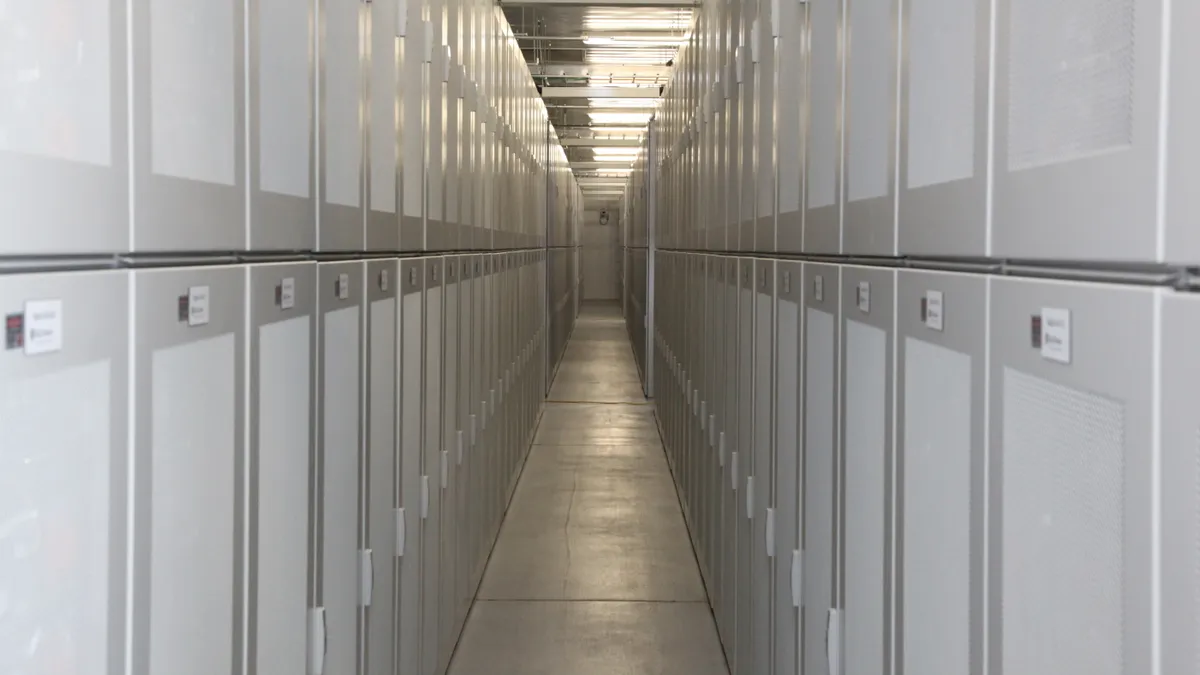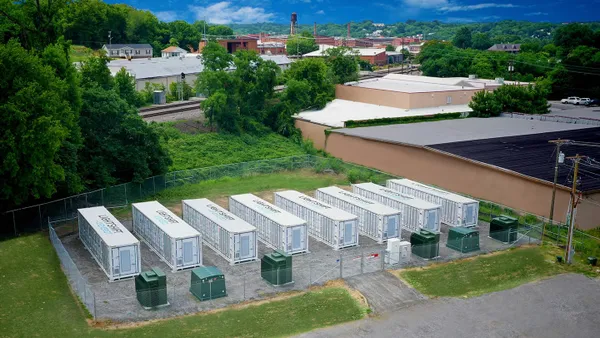Dive Brief:
- The comment period has closed in the Virginia State Corporation Commission's energy storage rulemaking, but the SCC granted an extension request from the state's investor-owned utilities for submitting proposed rule text.
- The Virginia Clean Economy Act (VCEA), passed in this year's General Assembly session, requires Virginia Electric and Power Company (Dominion Energy Virginia) to petition the commission for approval to construct or acquire 2,700 MW of energy storage and Appalachian Power Company (APCo) to petition for construction or acquisition of 400 MW of energy storage. SCC first must establish energy storage rules as directed in the VCEA.
- "We must deploy energy storage to its maximum potential, which includes far more diverse applications than simply backing up solar and wind," William C. Cleveland, senior attorney for the Southern Environmental Law Center, who represented environmental advocates before the commission, told Utility Dive in an email.
Dive Insight:
The SCC asked stakeholders to address a series of questions and submit suggested text for the regulation. The comment period closed July 29, but the commission granted an extension until Aug. 14 for submission of suggested regulatory text.
SCC requested comments on several issues, including:
- Should the regulation apply to non-utility storage?
- What interim storage targets should the commission set for APCo and Dominion?
- What behind-the-meter, non-wire alternatives, and peak demand reduction programs should the regulation include?
- What updates to existing utility planning and utility procurement rules should the commission adopt?
- What competitive behind-the-meter incentives and competitive solicitation-related programs and mechanisms should the regulation include?
- Should the regulations mandate or limit the deployment of certain types of storage?
- Should the commission establish definitions in its regulations for "energy storage," "energy storage capacity," "energy storage facilities," "energy storage project," and "energy storage resources;" and should each term have its own regulation?
"Our priorities are to provide safe, reliable and affordable electric service to our customers and more renewable energy and energy storage is an important part of that," a spokesperson for Dominion Energy Virginia said in an email.
APCo and Dominion submitted a joint comment, suggesting interim storage targets for themselves. APCo suggested adding 25 MW by the end of 2025, an additional 125 MW by 2030 and another 250 MW by 2035. Dominion suggested adding 250 MW by the end of 2025, an additional 950 MW by 2030, and another 1,500 MW by 2035.
The companies also asked that SCC set "high-level parameters" for most requirements, not create regulations for every term defined in the regulation, and asked that SCC's regulations apply both to utility and non-utility storage projects.
Virginia's electric cooperatives asked that the energy storage regulations only apply to APCo and Dominion. The cooperatives also requested that SCC not apply any compensation framework established in the regulation to cooperatives and municipal utilities.
Priorities for MD-DC-VA Solar Energy Industries Association (MDV-SEIA) include "setting interim target deadlines for storage deployment that consider and deploy a diverse set of project sizes, applications, and configurations to maximize benefits to ratepayers, and development of behind-the-meter programs, including peak demand reduction programs and incentives for resilience and low-to-moderate income households," David Murray, executive director of MDV-SEIA told Utility Dive in an email. The utilities asked that SCC not mandate the composition of energy storage.
MDV-SEIA is looking for a regulation that will drive the greatest benefits to APCo and Dominion's ratepayers.
Not-for-profit solar installer GRID Alternatives encouraged SCC to ensure low and middle-income customers receive relief and benefits from an energy storage scheme in Virginia.
"Our top priority is to ensure that energy storage and renewables are accessible to all Virginians, including underserved communities on the frontlines of climate change and economic injustice," Alexandra M. Wyatt, policy and regulatory manager for GRID Alternatives, told Utility Dive in an email.
"These are the communities that most urgently need the financial and resilience benefits of energy storage, especially paired with solar," Wyatt sad, "For that to happen, incentives for behind-the-meter storage need to be structured to effectively overcome barriers and ensure equitable deployment and community control."
In the group's submission to the SCC, GRID Alternatives said distributed rather than utility-scale storage more directly benefits low-income communities.
"SCC should affirmatively target disadvantaged communities with incentives for behind-the-meter storage," GRID Alternatives wrote.













